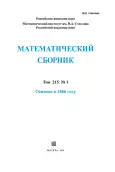Том 215, № 1 (2024)
Diffuse orthogonally additive operators
Аннотация
A regular orthogonally additive operator is a diffuse operator if it is disjoint from all operators in the band generated by the disjointness preserving operators. We present a criterion for principal lateral projections in an order complete vector lattice
 3-32
3-32


Hausdorff distances between couplings and optimal transportation with a parameter
Аннотация
We consider optimal transportation of measures on metric and topological spaces in the case where the cost function and marginal distributions depend on a parameter with values in a metric space. The Hausdorff distance between the sets of probability measures with prescribed marginals is estimated in terms of the distances between the marginals themselves. This estimate is used to prove the continuity of the cost of optimal transportation with respect to the parameter in the case of the continuous dependence of the cost function and marginal distributions on this parameter. Existence of approximate optimal plans continuous with respect to the parameter is established. It is shown that the optimal plan is continuous with respect to the parameter in the case of uniqueness. However, examples are constructed when there is no continuous selection of optimal plans. Another application of the estimate for the Hausdorff distance concerns discrete approximations of the transportation problem. Finally, a general result on the convergence of Monge optimal mappings is proved.
 33-58
33-58


Existence of solutions and their properties in a nonlinear eigenvalue problem
Аннотация
An eigenvalue problem is considered for a nonlinear nonautonomous ordinary differential equation of the second order on a closed interval with conditions of the first type and an additional (local) condition. The nonlinearity in the equation is due to a monotonically increasing nonnegative function with powerlike growth at infinity. The existence of infinite numbers of negative and positive eigenvalues is shown. Asymptotic formulae for the eigenvalues and the maxima of eigenfunctions are found, and comparison theorems are established.
 59-81
59-81


 82-98
82-98


Variational formulas for conformal capacity
Аннотация
Analogues of Hadamard's classical variational formula are presented for the Dirichlet integral of a normalized harmonic function under deformations of its domain of definition. Variational formulae for quadratic forms with coefficients depending on the inner radii, Robin radii, Green's functions and Robin functions of the domains under consideration are also presented.
 99-111
99-111


Construction of the asymptotics of the solution of the heat equation by the known asymptotics of the initial function in the three-dimensional space
Аннотация
An asymptotic approximation, as time increases without limit, is constructed to the solution of the Cauchy problem for the heat equation in three-dimensional space. The locally integrable initial function, which does not necessarily tend to zero at infinity, is assumed to have powerlike asymptotics. The method of introduction of an auxiliary parameter, which also involves the regularization of singularities in integrals, plays the central role in the research. The asymptotic expression for the solution is shown to have the form of a series in negative half-integer powers of the time variable, with coefficients depending on self-similar variables and the logarithm of time; the leading term is found explicitly. Using the example of the Cauchy problem for the vector Burgers equation, it is shown that to perform an asymptotic analysis of the solution by the matching method one needs to construct an asymptotic approximation to a solution of the heat equation.
 112-130
112-130


Asymptotic behaviour of the survival probability of almost critical branching processes in a random environment
Аннотация
A generalization of the well-known result concerning the survival probability of a critical branching process in random environment $Z_k$ is considered. The triangular array scheme of branching processes in random environment $Z_{k,n}$ that are close to $Z_k$ for large n is studied. The equivalence of the survival probabilities for the processes $Z_{n,n}$ and $Z_n$ is obtained under rather natural assumptions on the closeness of Zk,n and Zk.
 131-152
131-152










